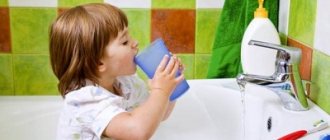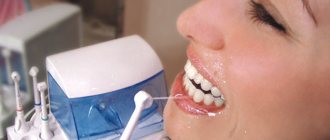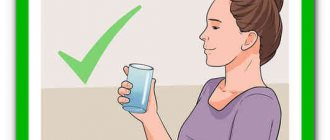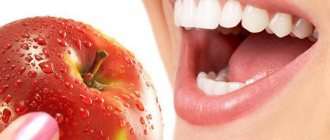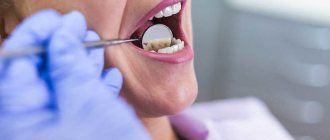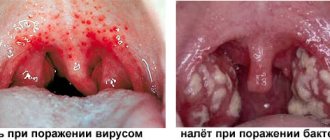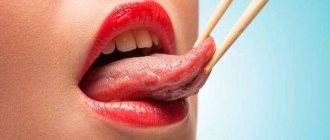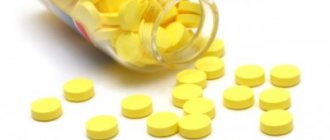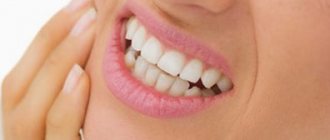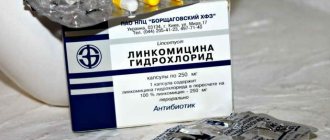Indications for use
The use of antiseptics allows you to better tolerate any inflammatory pathologies of the throat and oral cavity. Thus, treatment with local antiseptics is an important therapeutic and preventive measure for sore throats, colds, and tonsillitis. Pharmacies offer a wide selection of natural antiseptics that are used in the complex treatment of dental and respiratory diseases.
Important! Therapy of any dental disease also involves the use of antiseptic compounds.
Such rinses are designed to solve several medical problems:
- heal damaged oral mucosa after surgery;
- cope with inflammatory processes, relieve swelling and redness;
- “wash out” bacteria;
- prevent further spread of infection;
- remove bad breath.
Dentists prescribe local antiseptics to patients with gingivitis, stomatitis, periodontitis - those diseases the course of which is associated with intensive reproduction of pathogenic microorganisms and the development of the inflammatory process. Antiseptic and antibacterial therapy cannot be avoided after tooth extraction - this measure helps minimize the risk of infection of the empty socket.
How to rinse your mouth with antiseptics
The solutions are used regularly, the oral cavity is treated 3-4 times a day. The best option is to finish every meal with rinsing. For severe symptoms of an acute inflammatory process, dentists recommend treating the mouth with antiseptic compounds every 2 hours.
The temperature of the product should not be higher than 40 degrees - too high thermal indicators create favorable conditions for the proliferation of pathogenic microorganisms, cold solutions can injure already damaged mucous membranes.
Using Chlorhexidine for rinsing is simple: just take a little of the product and hold it in your mouth for a few minutes
Swallowing local antiseptics is prohibited; this may adversely affect the gastrointestinal tract. After tooth extraction, rinsing is prohibited. It is recommended to simply put a small amount of antiseptic composition in your mouth and hold it for several minutes (the so-called disinfectant bath).
Varieties
All solutions intended for mouth rinsing can be divided into several functional groups:
Antibiotics for stomatitis
- anti-inflammatory;
- antiseptic;
- painkillers;
- deodorizing;
- wound healing.
Most modern products sold in pharmacies are combined. Antiseptics can be synthetic and natural, made from plant components. In case of viral infection, dentists prescribe medications that, in addition to antibacterial properties, also have immunomodulatory and antiviral properties.
The most popular means: Interferon, Viferon, Laferobion. For oral candidiasis, Trypsin, Clotrimazole, Vitaon are recommended. To simply disinfect the oral cavity, use:
- Chlorophyllipt.
- Aekol.
- Hexoral.
- Iodinol.
The properties and features of the use of these products are described in more detail below.
Medicinal properties of potassium permanganate
Potassium permanganate (potassium permanganate) is produced in the form of a purple crystalline powder.
Before use, the drug must be diluted in water in compliance with certain proportions. A solution of potassium permanganate has several useful properties:
- Antimicrobial.
- Anti-inflammatory.
- Antiseptic.
- Antifungal.
Potassium permanganate acts as a neutralizer of toxic products released by pathogenic bacteria during their life processes. The product dissolves well in water, after which a specific chemical reaction occurs. As a result of interaction with the liquid, oxygen is released, which causes a pronounced disinfecting effect when a sore throat occurs.
Pharmacy compounds
Chlorophyllipt is an oil or alcohol solution based on eucalyptus extract. It has antiseptic, antibacterial properties, accelerates wound healing. The main area of application is purulent infections of the throat and oral cavity.
To disinfect the mucous membrane, prevent inflammation, caries and other dental problems during daily oral care, it is recommended to use pharmaceutical rinses
Calendula tincture is an affordable and popular local antiseptic. It copes well with bacteria, stops the inflammatory process, and helps heal ulcers on the mucous membrane. The greatest demand is for pharmaceutical tablets, which are used to prepare antiseptic solutions. For example, Eludril is an effective drug of combined action based on chlorhexidine (plays the role of an antiseptic), as well as other anti-inflammatory, analgesic, and wound-healing components.
Rotocan is a well-known herbal disinfectant. It contains extracts of chamomile, calendula, and yarrow. Rotocan has a detrimental effect on pathogenic microflora in the oral cavity, heals wounds, and relieves inflammation. Most often, Rotokan is prescribed to patients with purulent tonsillitis or stomatitis.
Important! This remedy must be used with extreme caution, since if the dosage is not observed, it can cause a local (systemic) allergic reaction or cause a burn to the mucous membrane.
Folk remedies
The most famous homemade antiseptic recipe is a soda-salt solution. So, take ½ tsp. each powder, diluted in a glass of warm water, used for rinsing. This is a safe and affordable composition that relieves inflammation, copes with hyperemia and swelling, and has a detrimental effect on pathogenic microorganisms. Rinsing your mouth with soda and salt is recommended for colds, sore throat, tonsillitis, stomatitis and toothache of various etiologies.
Important! If there are ulcers or purulent discharge, the solution is enriched with 3-4 drops of iodine.
At home, you can easily prepare an effective antiseptic composition yourself. To do this, it is enough to stock up on dry plant materials. As a rule, 2-3 tbsp is enough. l. herbs per glass of boiling water. The resulting product is left to infuse for 2–3 hours, after being wrapped in a blanket or poured into a thermos. The finished infusion is carefully filtered, cooled, and used for medicinal rinses.
It is not recommended to prepare alcohol tinctures for treating the oral cavity - such medications can cause burns to the mucous membrane. Moreover, before using pharmaceutical compositions containing alcohol for rinsing, they must first be diluted with water (the proportions are usually indicated on the packaging or indicated by the attending physician).
Which herbs have the most pronounced antiseptic properties:
- chamomile;
- liquorice root;
- plantain leaves;
- yarrow;
- calendula flowers;
- sage.
How else can you disinfect the mucous membranes of the mouth and throat at home? Add a few drops of bergamot or clove oil to warm water and rinse for 2-3 minutes. The oil can be applied directly to the gums or left for a while. Esters have analgesic, anti-inflammatory, and antiseptic properties. You can brew a tea bag, cool, apply to the inflamed area, and leave for 10-15 minutes. The tea will soothe the mucous membranes, as its leaves contain tannic acid.
Saline solution (1 tsp per glass of warm water) is the most affordable home antiseptic
For inflamed gums, it is best to rinse your mouth with peppermint oil diluted in a glass of warm water (a few drops). This solution relieves pain, disinfects soft tissues, and stops the further development of the pathological process.
Methods for preparing the medicinal composition
There are various methods of treatment with potassium permanganate solutions. A sore throat will benefit from:
- composition with potassium permanganate and water;
- combination with added iodine;
- alternating a solution of potassium permanganate with hydrogen peroxide.
To prepare the monocomposition, several crystals of potassium permanganate are dissolved in a glass of warm boiled water. The product should acquire a characteristic pale pink color. This solution can be made even more effective by adding no more than 2 drops of iodine to it.
Please note that the solution should be a slightly pale pink color. Just add a few crystals of potassium permanganate and be sure to stir well.
The number of procedures performed during the day is determined by the type of disease. So, gargling with potassium permanganate for sore throat is carried out up to 5 times a day; for scarlet fever, tonsillitis, 2-3 sessions will be enough.
In the case of the development of pharyngitis, purulent laryngitis, a combination of two solutions - potassium permanganate and hydrogen peroxide - has a pronounced therapeutic effect . A weak solution of potassium permanganate is alternated with a peroxide solution (1 tablespoon of the component per glass of non-hot boiled water). This treatment regimen allows you to clear the tonsils and root of the tongue from bacterial plaque.
Before using potassium permanganate solutions for the treatment of ENT diseases, it is necessary to obtain specialist approval. Only an experienced doctor will tell you whether this substance can be present in the general treatment regimen.
How to rinse a child's mouth and throat
Natural antiseptics - decoctions and infusions based on medicinal plants - are best suited for children. Thus, the following herbs have good disinfecting properties: St. John's wort, sage, chamomile, calendula, oak bark. They are used to treat childhood stomatitis, tonsillitis, and other inflammations of the throat (oral mucosa).
Synthetic pharmaceutical solutions are approved for use by children over 3 years of age, and then only if the child has already learned how to rinse his mouth correctly, and the risk that he will swallow the medicine is minimal. Pharmacy drugs such as Miramistin and Furacilin are considered the safest for children.
It is noteworthy that ready-made mouth rinses (preferably based on herbal ingredients) can be used daily for preventive purposes. Such products wash away pathogenic bacteria from the mucous membrane, fight inflammation, take good care of teeth and gums, and also prevent the further spread of infections. It is better to entrust the choice of mouthwash to your dentist.
As you can see, local antiseptics for the oral cavity are designed to solve a lot of medical problems - such products not only disinfect the mucous membrane and fight dental problems, but are also used to treat respiratory diseases of an inflammatory nature. Only a doctor should select synthetic or natural antiseptic compounds.
Is it possible to gargle with potassium permanganate?
It is allowed to use potassium permanganate for gargling from the age of 6 years.
Its use will bring positive results for various ENT diseases: With the development of these pathologies, a solution of potassium permanganate will help destroy pathogenic flora and speed up the healing process. The drug disinfects the surface of the tonsils and has drying properties . The product can be used alone or combined with various medications.
Despite the variety of modern antiseptics, potassium permanganate still remains a popular remedy used to combat pathogenic bacteria in various medical fields.
